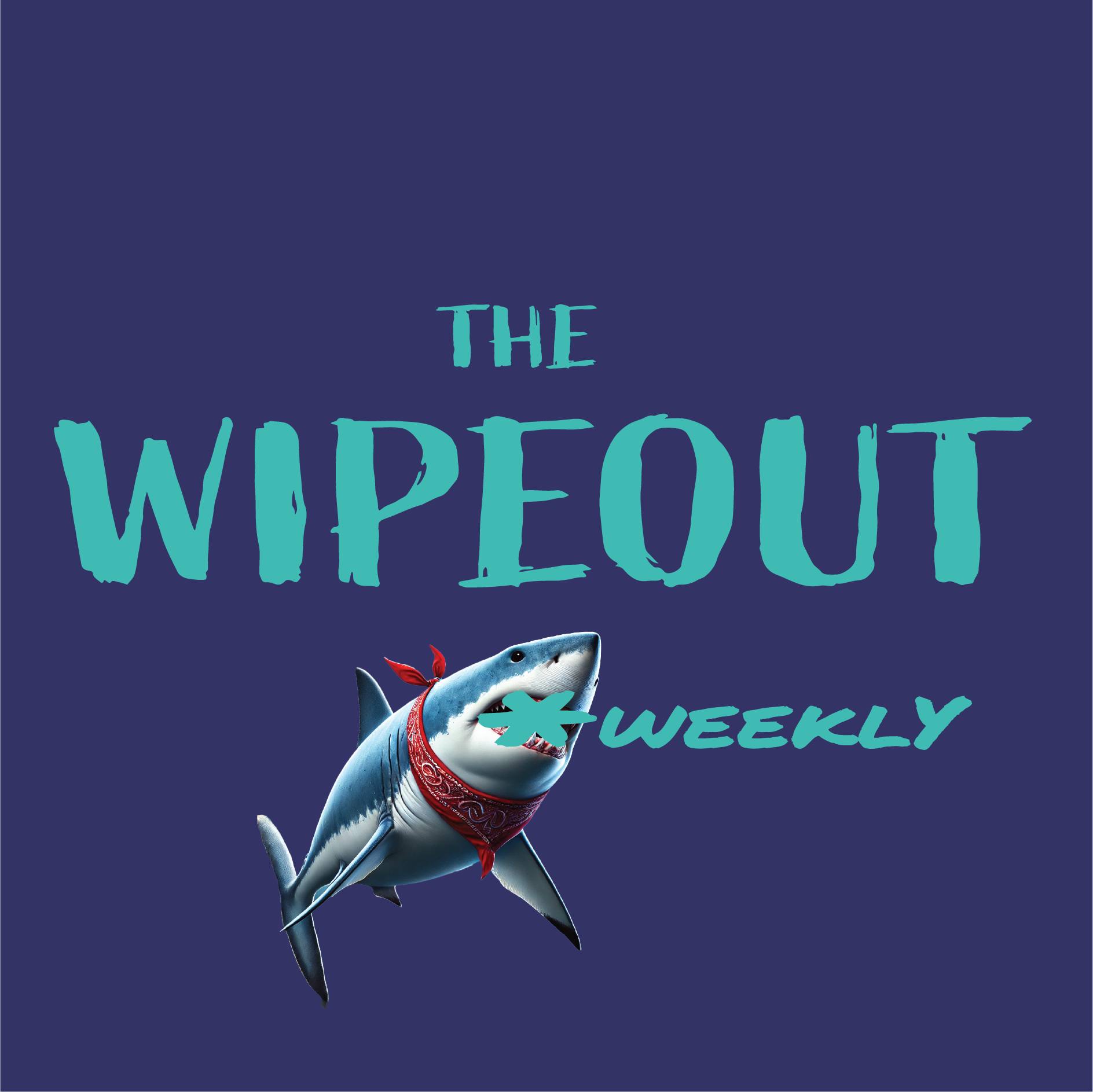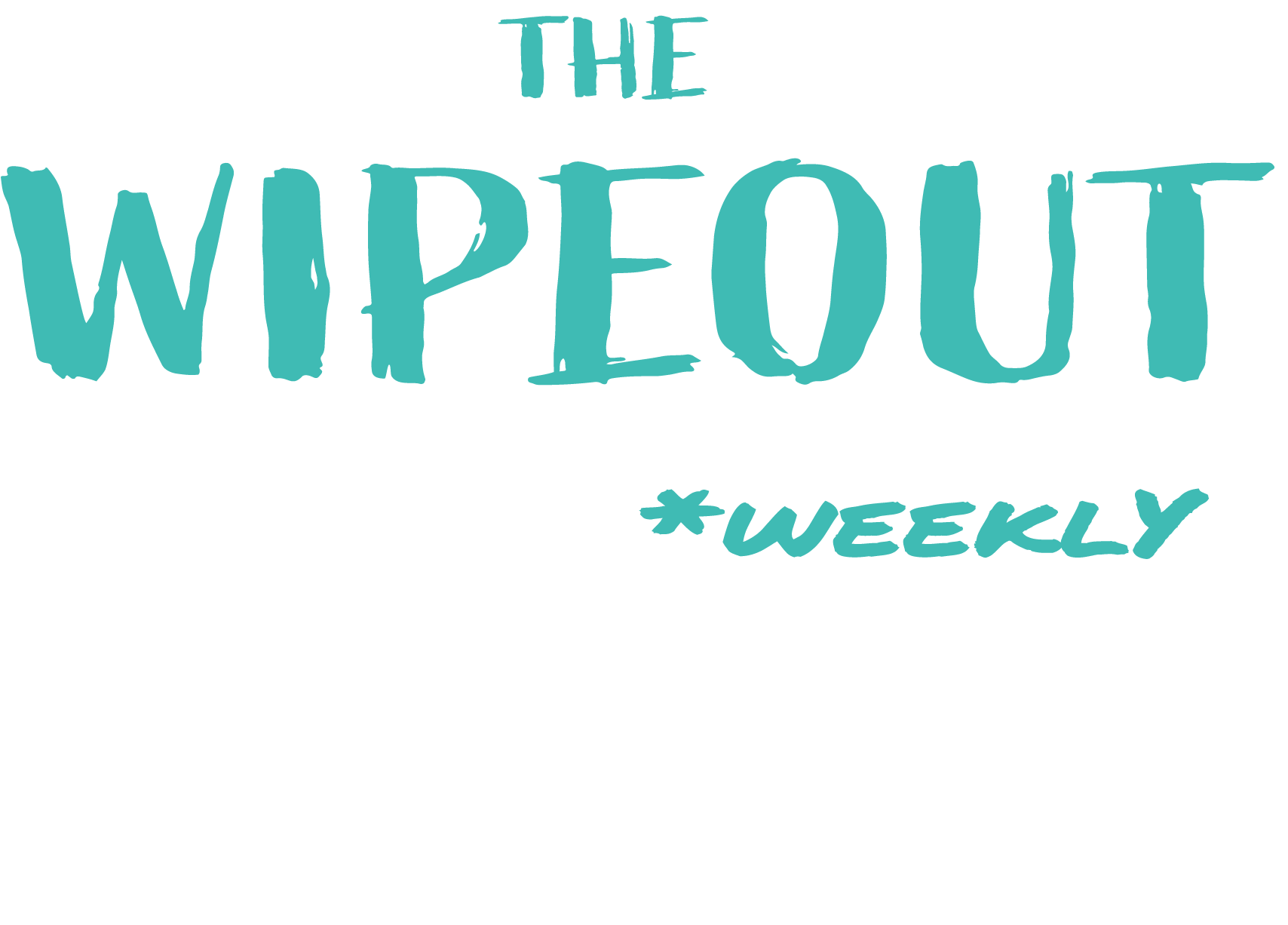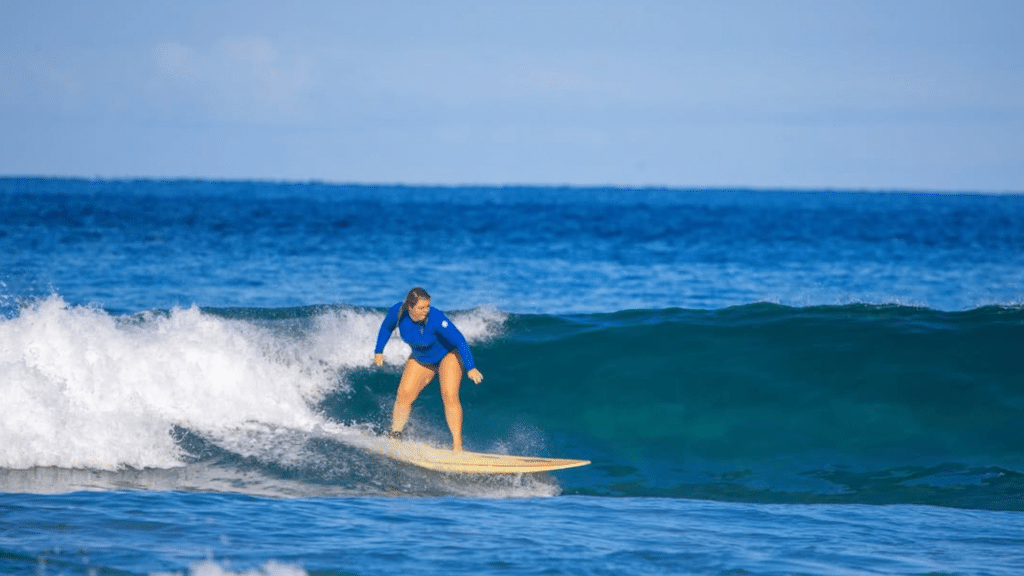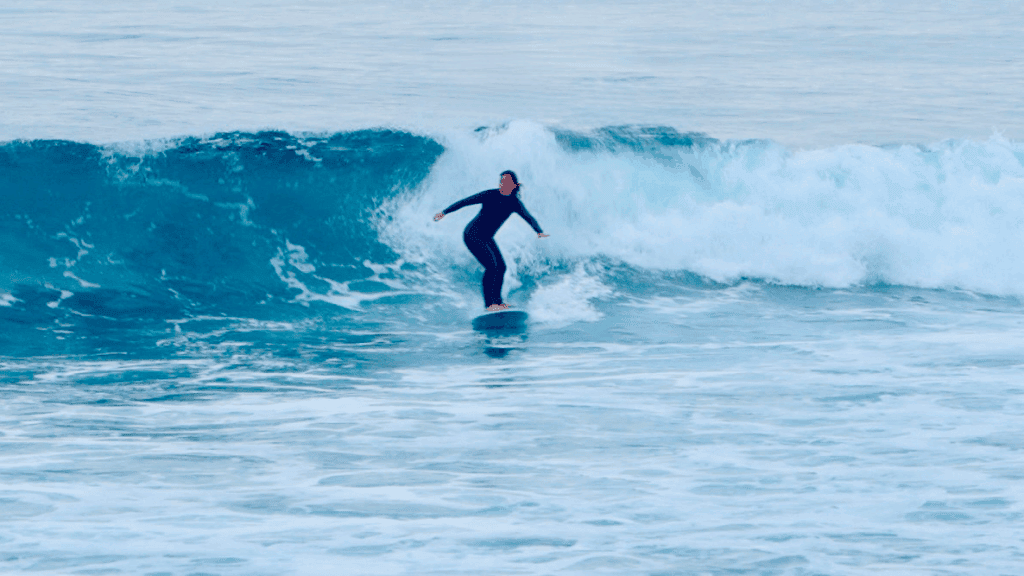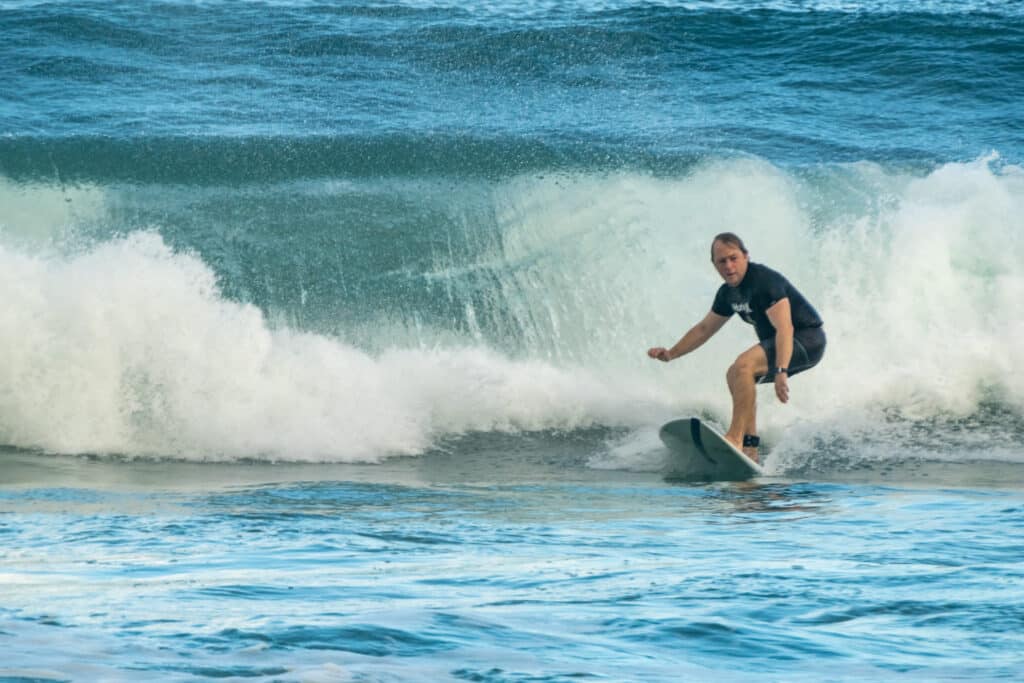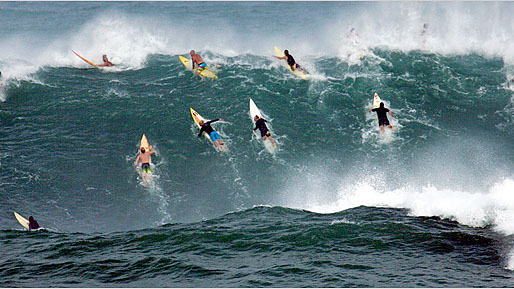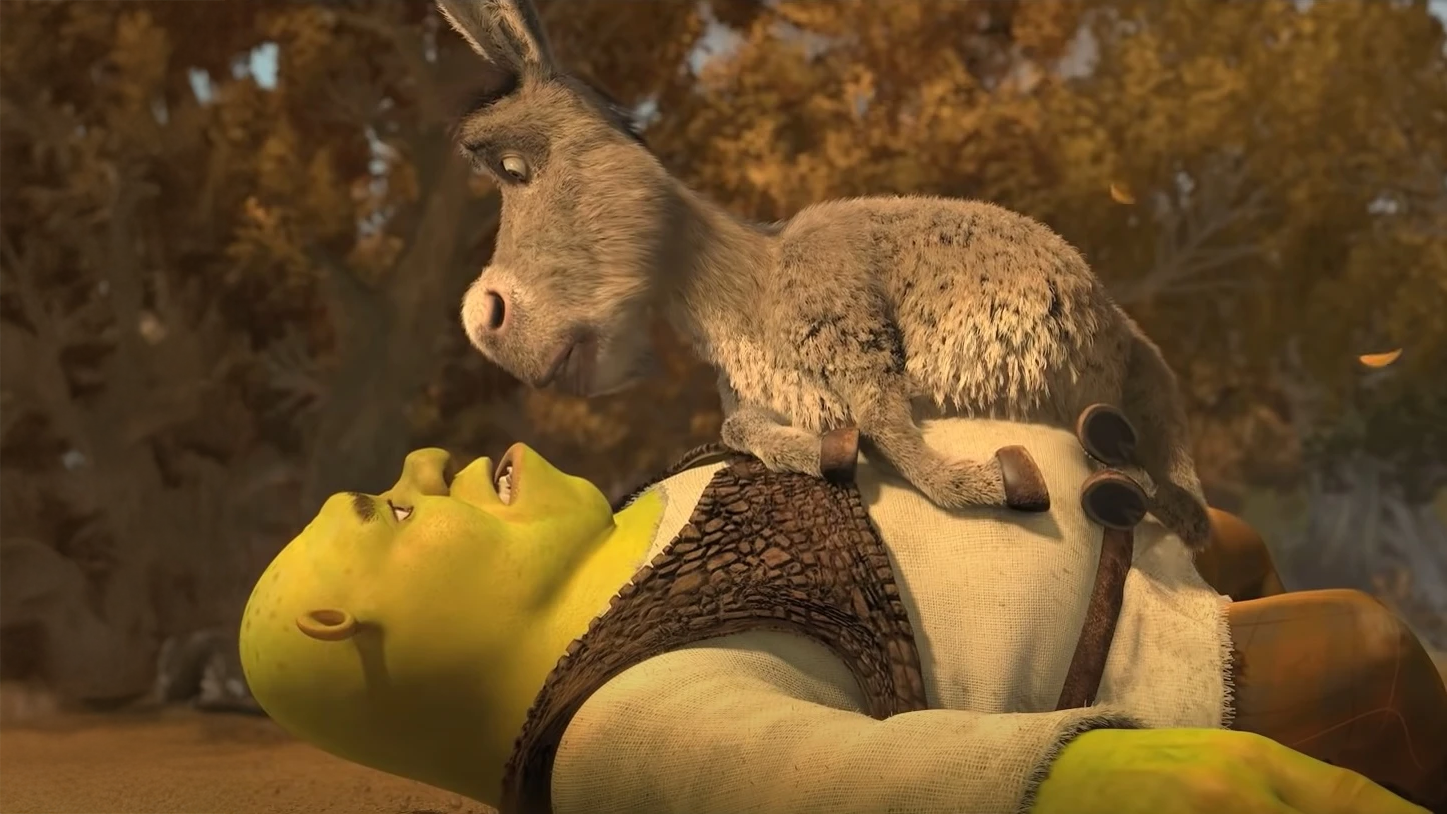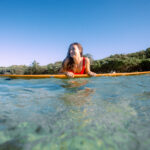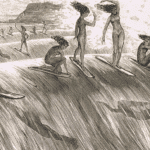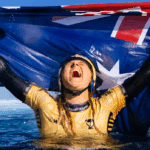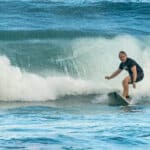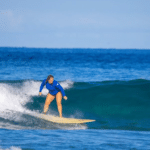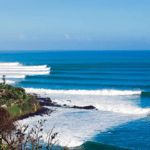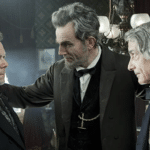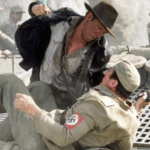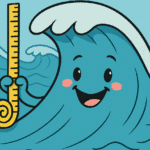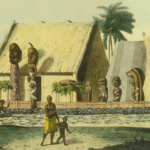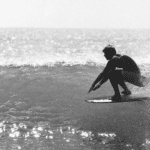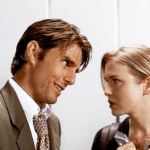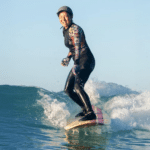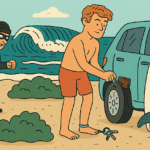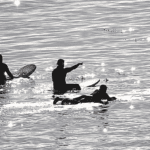Now Reading: Can I be honest with you? You are just not surfing enough to progress
-
01
Can I be honest with you? You are just not surfing enough to progress
Can I be honest with you? You are just not surfing enough to progress
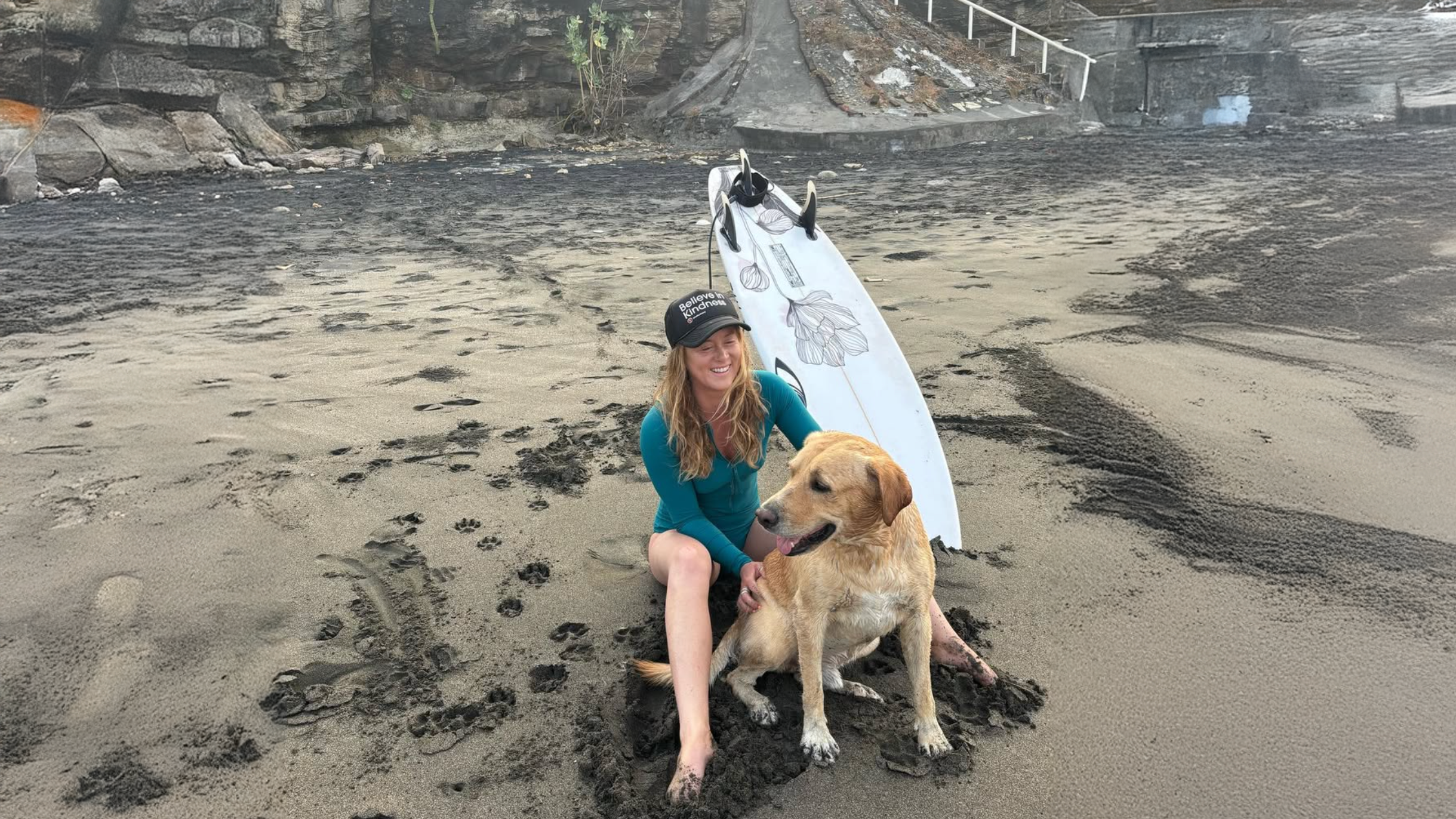
This Wipeout Weekly podcast episode transcript was abbreviated to a blog post format by my good friend Chad (ChatGPT). You will find the full transcript below it. Host: Zuz Wilson | Guest: Kyla Peterson
Everyone should try surfing at least once—it’ll change your life. Just standing up on a tiny whitewash wave is enough to shift something in you.
Welcome to The Wipeout Weekly, your daily hit of wipeouts, breakthroughs, and beginner surf truths. I’m your host, Zuz Wilson.
Let’s go out. Today I’m chatting with Kyla Peterson, owner of Surfin Fire Surf School in Oceanside, California. Her journey from sand-hating toddler to full-time surf coach is anything but typical.
Kyla: My dad’s a firefighter and started the surf camp when I was seven. I basically lived at the beach every summer since then.
Zuz: Were you surfing before the camp?
Kyla: He’d take me out and put me on the front of his board. I was a beach baby—except I hated getting sand on my hands!
Zuz: Do you remember your first wave?
Kyla: Not really. Most of my early memories are from the camp—getting pushed into waves, building confidence. One of my first “rides” was probably my dad picking me up while standing on the board.
Zuz: You run the surf school now. Did you always plan to?
Kyla: Nope. I actually went to school for dental assisting and worked in that field for seven years. Then COVID hit.
A friend needed help coaching surfing. I filled in, and something clicked. I was also going to school for ultrasound tech, but eventually dropped that too. Coaching just made sense.
It was a grind. I took a huge pay cut and picked up shifts at dental offices while building up my coaching.
But two years ago, things took off. My dad gave me the Oceanside Pier location—my home break. It was a dream.
He still runs the Stone Steps camp in Carlsbad, but he’s retiring from the fire department soon. Maybe I’ll take over that one too.
During COVID, the surf boom was real. Surfing became this accessible, outdoor escape for so many.
Once you have the board and wetsuit, you’re set. That first wave? Hooked for life.
Zuz: What’s the philosophy behind your school?
Kyla: I want to empower surfers—especially women—to feel confident in any lineup. That’s my mission.
I created a five-part women’s surf clinic. We start with basics—pop-ups, paddling, safety—and build up to confidently navigating lineups.
I call it going from “insider sliders” to “outsider riders.” It’s structured, fun, and focused on safety—thanks to my dad’s firefighting mindset.
Zuz: What do you wish every beginner knew?
Kyla: That it’s hard. And that’s okay. Be kind to yourself. Have fun.
My toughest move? The pop-up. Still is sometimes.
Zuz: Any tips?
Kyla: Make sure your board fits your level—bigger is better at the start. And focus on hip mobility. I worked with a physical therapist and it made a huge difference.
His pop-up guide includes land drills—hip 90/90s, power push-ups, and more. It really helped my pop-up speed and technique.
Surfing takes consistency. Even after decades, I still wipe out. But keep going.
Going out once a week? Expect slow progress. Four times a week? That’s how the pros train.
My cousin is pro surfer Alyssa Spencer. She surfed every day, no matter the conditions. That’s what it takes.
Zuz: Can you learn on your own?
Kyla: You can—but it’s frustrating. A coach can seriously speed things up and help you avoid common mistakes.
Biggest beginner mistake? Not knowing surf etiquette. It’s not just about you—it’s about everyone’s safety.
I teach etiquette in every lesson. Where to paddle, how to avoid collisions, reading waves—it’s essential.
Surf etiquette isn’t written down anywhere, but it should be. Think of it like driving—there are rules for a reason.
Are lineups crowded? Some are. But there are still plenty of quiet pockets—you just have to look.
Zuz: Let’s talk surf retreats. Are they growing?
Kyla: Yes! Retreats make surf travel feel less intimidating—especially for women. It’s a great way to connect and grow.
There’s room for everyone. Every retreat has its own vibe.
Zuz: Would you recommend a retreat for beginners?
Kyla: Absolutely. Our Nicaragua retreat is designed for first-timers. No experience required.
Being around better surfers motivates you. You push harder. You grow faster.
Zuz: Is it better to surf with people who are more advanced than you?
Kyla: 100%. It’s inspiring. It also makes you feel safer—and when you feel safe, you push your limits more.
Video reviews help too. I use PACTU. Seeing your body in motion helps you fix what you can’t feel.
Zuz: Favorite places to surf?
Kyla: Nicaragua, Costa Rica, El Salvador, Baja… all special in different ways. Nicaragua still feels wild and magical to me.
Longboard or shortboard?
Kyla: Both. I used to compete on longboards, but I love the adrenaline rush of a punchy shortboard session. I’ve got a tiny car, so whatever fits, wins.
Zuz: Biggest wave you’ve surfed?
Kyla: 10 feet. That’s my cap.
Zuz: Would you call yourself an advanced surfer?
Kyla: I consider myself an intermediate. I coach, I surf often—but hey, I still mess up.
Zuz: Has surfing taught you anything for real life?
Kyla: So much. Patience, self-compassion, respect for nature. The ocean’s been a constant teacher.
Final word—should everyone try surfing?
Kyla: 100%. Just once. That one wave can change everything.
Zuz: Where can people find you?
Kyla: Website: surfinfireoceanside.com, Instagram: @surfinfire_oside and @kylapeeties I love connecting—mindset, surf travel, anything.
That’s all for today! Subscribe to The Wipeout Weekly newsletter, and we’ll see you tomorrow.
Full transcript: Interview with Kyla from Surfin Fire Surf School
COMING!
(0:00) Everyone should try surfing at least once because it will change your life just that one time, (0:05) like smiling, standing up on like the tiniest whitewash wave, your life will be changed.
(0:11) Welcome to the Wipeout Weekly, the daily podcast for beginners, wannabe surfers, (0:17) and seasoned Wipeout enthusiasts. No hype, no filler, just the highs, lows, (0:24) and honest truth about learning to surf and finding your place in surf culture.
(0:29) I’m your host, Zuz Wilson. Let’s go out. You see, you know, everybody, I grew up here.
(0:37) So my dad is an instantaneous firefighter. And that’s, I mean, I was born and raised (0:45) here in North County, San Diego, and he started a surfing fire, a surf camp when I was seven years (0:55) old. And so I lived on the beach every summer since I was seven years old.
And, (1:01) and I feel like the surf industry is kind of small. Like once you’re in it, (1:06) you, you know, this person and this person, and it just kind of weaves a little web. (1:13) But did you surf before he started the surfing school before you were seven years old? (1:18) Yeah, yeah.
He would always like take me out and put me on the front of his board. And I (1:23) was a beach baby, but he always likes to joke because he’s like, yeah, when you were, you know, (1:29) like a baby or just walking around toddler on the beach, you would fall in the sand. And I guess I (1:36) would like lay there like face first with my hands up because I didn’t want to get my hands sandy.
(1:45) And I would like lay there and be like, Dad, or like, Mom, pick me up because I hated the sand. (1:53) You don’t remember probably your first surf? (1:57) I don’t. I honestly don’t.
I started remembering more of like my surf sessions when the camp (2:05) started. And a lot of those like childhood memories are at the surf camp. So yeah, it’s just (2:13) a lot of like, instructors pushing me into my, you know, first waves and, and then eventually, (2:19) like you get confidence, and then you start going further out.
But yeah, I mean, spending every day (2:26) at the beach in the summer from seven on you progress like pretty quickly and just get really (2:31) comfortable with the ocean. So. So I cannot even ask you whether you popped up on your first wave.
(2:38) Yeah, it would it would have been like one of those things like you see the pro surfers taking (2:43) their little babies out and then the dad like standing up on the board and then picking the kid (2:49) up that I think that probably was like my first official standing on a surfboard wave being my dad (2:56) picking me up and being like, all right, Kyla, you’re doing it. So. So now you run your dad’s (3:04) surf school.
Was there ever a question of you actually doing anything else? (3:10) Yeah. So I think when I got older, I started like kind of working for him here and there (3:19) like in high school a little after high school. And I don’t know if anyone else can maybe relate, (3:27) but working for sometimes working for your family is like, I don’t know if I want to do this.
(3:32) I kind of want to branch off and find my own way. So I ended up going to (3:40) or I was going to community college, I didn’t really know what I wanted to do. (3:43) And then I think I did that for two years was just still really unsure.
And and then I was like, (3:53) Hmm, I heard my friend talking about being a dental assistant and loving it. So I was like, (3:58) I’ll check that out. So I actually went to school for dental assisting and did that for seven years (4:05) of my life.
And then COVID hit. And I had this friend who she was surf coaching that was like (4:12) her main source of income and everything that she was doing at the time. And she got really busy (4:18) during COVID.
As did everyone like COVID hit and everyone’s like, what do we do? And surfing, (4:24) I think was just a really easy no brainer. You’re just getting outside, you’re saying, you know, (4:29) six feet distancing kind of thing. So she was really busy, and she needed help.
(4:33) And so I was like, you know what, since since I have the time now, because the dental office (4:40) wasn’t open that I was working at, I was like, Sure, I’ll help you. And at the time, too, I was (4:46) going to school for ultrasound tech. So I was going to switch out of dental and go into ultrasound.
(4:54) But I think the more I started surf coaching with her, the more I started realizing that I (5:01) didn’t want to do ultrasound. And I was like, this makes so much more sense. It’s in my family, (5:11) like blood.
Why don’t I just do this? So I act I start stopped doing school for ultrasound and then (5:19) stopped dental and started like surf coaching, but it definitely was a grind because I still (5:27) I took like a huge cut in pay. So I still was temping and picking up at random dental offices. (5:35) And then maybe about two years ago, I started like gaining a lot more momentum with the surf (5:45) coaching stuff and meeting, meeting more people and working with more kids and like, Oh, I work (5:51) a lot of like young female adults or females of pretty much any age.
And then my dad, I think also (6:00) saw like, Okay, Kyle is ready to take over the business. She’s doing really well with the surf (6:04) coaching stuff. So then he gave you he has two locations, and he turned over the Oceanside Pier (6:12) location to me.
And that’s honestly like where I did most of my surfing anyways, like I live in (6:20) Oceanside. All my friends are in Oceanside. All my friends surf the Oceanside Pier all the time or (6:25) the harbor.
You’ll see like a lot of pros out. So I was just like, so excited when he was like, (6:31) Do you want to take over the Oceanside Pier? And I was like, Yes, like, that’s a no brainer. So (6:36) and he has two locations.
So he still runs the stone, the one at stone steps, which is in like (6:42) Carlsbad area, Carlsbad, Acadia area. And then I think he is actually retiring from the fire (6:50) department, June of this year. And then I think he might continue the surf school for maybe another (6:58) two years.
But then we’ll see. Maybe I’ll take over that location too. I don’t know.
(7:04) But I’m having a lot of fun at the pier. (7:06) Oh, I bet. I bet.
You see, I never suspected that this was your journey. I always just assumed that (7:14) since you know, your dad had a surf school that you just naturally were groomed to take over. (7:23) Interesting little detour into the dental school.
But you mentioned COVID. And (7:30) um, can you tell us like, what the difference was in terms of people who were coming to your school (7:38) and wanted to surf? And then with that explosion that we all you know, keep talking about and all (7:43) these COVID surfers? Was there a different profile of a person who wanted to learn to surf? (7:50) Or was it just more people? I think it was just more people like the world kind of just went on (7:57) pause. And everyone’s like, what do I do with my time now and surfing? (8:04) In a sense, like as it can be really expensive to be a surfer.
But I think it’s one of the more (8:11) accessible things like same with like riding a bike, but riding bikes not for everyone. I think (8:17) Southern San Diego or, you know, Southern California, everyone’s like, it’s sunny out, (8:24) the water gets not too cold, you just drive down to the beach, like it’s a whole day thing. (8:33) So I mean, once you do the initial investment of like the surfboard and wetsuit, (8:39) you just show up to the beach.
And it’s like, I don’t know, I think it’s addictive to like, (8:45) you know, once you catch your first wave, you’re like, I want to keep going. I know. But yeah, (8:51) I didn’t really see too much of a difference in like, the clientele.
I think everyone wants to (8:58) try it at some point in their life. Some people are like, Oh, no, too afraid of the ocean. (9:04) But yeah, it just got busier, I think, because it’s like, what do we do now? (9:09) Is there a specific philosophy behind your school and your dad’s school that maybe is (9:14) different from how other coaches teach surfing? (9:18) I think since taking over the Oceanside Pier location, and running a business, (9:27) that honestly has helped a lot with my own like, self confidence and self worth and, (9:35) and that sort of stuff.
So I feel like I’ve taken that kind of growth and life journey (9:45) and applied it to my surfing. And when I have been able to do that, just being, (9:54) I guess more focused on helping other surfers, especially females in the surf world, feel (10:03) and build their own confidence so they can like, or it’s, I feel like my purpose now is to empower (10:12) female surfers and I mean, surfers of any gender, to feel confident in any lineup around the world. (10:19) So I have created programs like I do a five part clinic series, or it’s a five part like (10:29) class clinic series over five months.
And it’s like specific for women surfers who want to learn (10:36) how to surf. And so I take them from the very first class, we just focus on the fundamentals (10:44) and the basics of surfing. So that’s like popping up handling the board, what kind of wetsuit are (10:50) you going to be wearing? What kind of board you need to have the most fun and right, you know, (10:57) ride the furthest that you can.
And then the next session actually, or the next class, (11:04) we start focusing on a little bit more. So I add a little bit more each time go over like paddling, (11:09) how to get up and over waves, turtling, dock diving. And then the next class, we kind of build (11:16) a little bit more on that one too.
And so I think for class three, I had them do like a little paddle (11:22) relay, all the women that were in the clinic. And it was fun, because they’re like, that was (11:28) so helpful to actually do, you know, do a team effort, do a lay down paddle, and then a knee (11:35) paddle. And then the next class, I had them paddle all the way out through the lineup, (11:41) or through the whitewash to get out into the lineup.
And we didn’t necessarily catch any waves (11:47) then, but it’s just to get them comfortable and like slowly push them and then get them (11:52) homework between each class to like keep them accountable. Because my whole thing was, well, (11:59) in a normal lesson, you spend maybe 10-15 minutes on the beach with your instructor, (12:05) doing a quick kind of overview of everything you need to know. And then you go out in the water, (12:11) they kind of really super hands on pushing you into waves, making sure you just have the most (12:16) fun.
Whereas this clinic series is really extensive, we probably spent like an hour (12:22) on the beach going over multiple different topics, and then applying it in the water. (12:29) And so by the end, the goal was to have these ladies be masters of I like to call them the (12:36) insider sliders. So be masters of the insider sliders, and then be able to feel confident (12:44) enough to push themselves to then become masters of the outsider riders is what I call it.
(12:52) So I just, I love to have fun with it. I think that kind of sets us like certain fire apart (12:58) to is just like number one priority is to have fun. But also, I think with my dad’s firefighting (13:04) background, like he totally instilled safety in me.
So a lot of the topics like would be (13:09) ocean safety, how you know what to do in a rip current, how to navigate like by the pier, (13:15) that sort of thing. So I’m really hands on with the safety stuff. And having fun like I’m, (13:22) I’m just a big grom.
But so that’s kind of my main focus is really empowering surfers to feel (13:28) confident and comfortable. Is there one thing that you wish everybody that you’re working with, (13:35) like everybody who’s a beginner surfer and has their first lesson that you wish that they would (13:40) know before having the first lesson? I think the biggest takeaway for especially for any sport, (13:51) just to have fun with it. And, and not be like super hard on yourself, (13:57) because especially with surfing, you kind of are, you’re in the in the ocean, and the ocean (14:09) can be sometimes really nice and playful.
And it makes it so much fun. And then other days, (14:19) you’ll get so frustrated, and like pounded by the ocean, and question like, why am I doing this? (14:31) And to not let those days discourage you, like if it’s something that you want to pick up and keep (14:37) continuing to not like you’re gonna, it’s just like life, like you’re gonna have the ups and (14:43) downs. I think surfing though, is a great parallel for life in general.
But yeah, just I guess to have (14:49) fun. If you never surfed, just who cares what you look like? Just have fun. This was a tricky (14:55) question.
I only thought about it this morning. And my answer would be like, just for them to (15:00) know that surfing is really hard. Don’t be hard on yourself.
Because you know, everybody makes (15:07) it look so easy. But I’ve been doing this for decades. The hardest thing for me and surfing (15:14) is the pop up.
And you’ve been teaching so many students. Is there anything that you can tell us (15:22) that would make it easier for us to pop up? Maybe there is a mystery that can be just (15:29) unraveled in this episode, and it’s just going to make everything okay. (15:36) I think a lot of it.
I mean, there’s so many different factors, though, too. So (15:43) a lot of it, like if you’re having a hard time popping up, you can just start looking at different (15:50) factors. Like what is your what kind of equipment are you riding? Because if you’re riding a smaller (15:55) board, it’s definitely going to be way less stable.
So it’s going to be a lot harder to pop (16:02) up because you’re going to have to create your own stability by paddling more efficiently to (16:09) gain that momentum. And then the momentum is what gives you the stability for an easier pop up. (16:16) But like when you’re learning and you’re beginning, I think making sure you’re on the right (16:22) board and a big enough board to add that stability, whether it’s like super wide, (16:27) the wider the board, the more stable it’s going to be or really long.
And then a lot of it, too, (16:34) is just like your body’s physical ability. So I’ve worked with a couple physical therapy. Sorry, (16:46) my computer is having a little pop up.
But I’ve worked with a couple physical therapists, (16:53) and they have all said a lot of the focus should kind of be on your hip mobility and then creating (16:59) that space. So like when you go to pop up, you’re pushing and then you have now you’re (17:04) trying to create space between the board and your chest so you can bring your front leg and knee (17:12) forward. So and because I see a lot of people, they’ll get stuck bringing their knee and leg (17:18) onto the outside of the elbow.
And then your foot’s like all the way over here and the stringers (17:23) over here. So then you’re off balance already. And it’s so hard to swing your leg around.
(17:29) So I think a lot of it is just on land practice of working on your hip flexibility, (17:36) too. So you can bring your knee through your chest. And my my good friend he who’s a physical (17:44) therapist, his brand is called the nomadic athlete.
And he actually created this really (17:50) great pop up guide. So he has like a couple exercises in the pop up guide. And I’ll open (17:57) it here to see.
Because he I honestly was having like a slow pop up a couple years ago. And I’m (18:04) like, what’s going on? Like, why am I struggling? And he gave me this pop up guide. And I kind of (18:14) fit it into my gym routine.
And it helped like he was like, Oh, I noticed a huge difference in (18:20) how quick you’re popping up now and having my feet in the right position. So he even has like stuff (18:27) like, um, yeah, he really breaks it down, like, understanding the pop up, like why you should (18:33) continue to keep your pop up sharp, even common limitations. So a lot of I’m, and maybe you can (18:41) relate to this, like, um, the limitations that he has found is one, not enough mobility to not (18:51) enough strength, three, poor technique, or four, like having a combination of all of the above.
(18:59) And, and then the exercises that he has you focus on is going to be like, adding hip mobility, (19:06) back mobility, speed, power and strength. So he does like seated hip 9090s. Squat stance 9090s (19:18) prone press up, power push up, back foot pop in place.
So that’s like what they call like the (19:25) step up method, the more you can create the muscle memory and the muscle patterning. So the more you (19:33) practice this on land, then eventually you will see results in the water on your surfboard. And (19:40) it just comes with time, like you know, with surfing, it’s so challenging to learn.
And it (19:46) takes consistency, and a lot of time in the water. Like I’ve been surfing my whole life. And (19:53) I’m like, why I can’t sometimes I like have trouble with my turns or something like that, or I even go (19:58) over the falls.
So I mean, it happens to all of us, no matter how long you’ve been surfing. It (20:04) just takes a long time and a lot of like discipline and consistency and practice. And you know, you (20:10) find every every day you can find something else that is an obstacle to your pop up like this (20:16) morning, I discovered that my big toe is just too long, and it’s just dragging on the board.
(20:23) So I’m just gonna have to cut it off. There’s seriously, there’s there’s always an excuse. But (20:31) yeah, consistency is key.
If if I was going out every single day practicing, I’m sure (20:37) I’m sure out. Yeah, I’ll be popping up much, much better. (20:41) I mean, if you’re only going out once or twice a week, you might not really ever see any progress, (20:50) or it’s going to be like, extremely slow.
So if you’re going if you can commit to like going out, (20:59) I mean, four times a week, like that’s how. So my real quick, my cousin, my younger cousin (21:05) is Alyssa Spencer. And I used to live with them when she was 12 years old.
And I remember (21:13) driving her to the beach, like she would surf every day.
(0:00) And she would surf for hours and she would sometimes like I would we would pull up to the (0:04) beach and it would look so bad. I and I’m you know like 22 and I’m like I’m not paddling out in this (0:13) but she would go out and so it just like she got to that the level she’s at now because she put in (0:20) so many hours no matter what the surf looked like. I think there’s so many variables in surfing (0:29) like you have the ocean and ocean awareness and stuff like that so it really depends on the (0:36) person and the individual how quickly they progress.
Some people like progress super quickly (0:43) other people it might take them a lot longer and they might have to work harder on at that and (0:48) I am not sure why that is but it just totally varies like it can be so different person to (0:54) person. Do you think it’s possible for a person to learn to surf on their own? (1:01) Yeah I mean for absolutely I think I mean if you’re going to try to learn surfing (1:07) majority of the time that you’re going to be surfing is without like a surf coach or someone (1:11) teaching you. The only thing I say with that is it it can be frustrating learning on your own (1:18) so I think maybe taking a lesson here and there or if you are able to commit to a surf coach (1:25) because then you’re at least getting the feedback and what the only reason I would suggest a surf (1:31) coach is it’s going to take learning on your own to learning with a surf coach and it’s going to (1:36) speed your like learning curve up it will cut it in half.
You’ll see a lot more progression but (1:42) I mean I’ve seen people who are self-taught too it’s just and and you figure it out it’s like (1:48) learning you know you make a mistake you go out try it again you’re like okay I’m not going to do (1:53) that or I’m not going to be you know this far up on my board because I’m going to get water up my (1:58) nose from nose diving so it’s just trial and error but if you’re the type of person that gets (2:04) frustrated really easy then maybe working with a surf coach like a couple of times in the beginning (2:09) so that way you have more like surf knowledge and ocean awareness. Are there any rookie mistakes (2:17) that all surfers that are starting their surfing journey make? I just think a lot of it comes down (2:26) to like maybe not knowing surf etiquette I think that’s a huge piece that is missing in a lot of (2:35) like like learning how to surf if you think you can just go pick up a board and paddle out (2:40) sometimes in my eyes that can be actually kind of dangerous if you don’t know surf etiquette (2:47) because now not only are you maybe putting yourself in danger or at risk of like getting (2:54) run over not knowing what to do with a big board like getting yourself in a situation where it’s too (3:00) big and you panic and I’ve seen people take off their leashes which is crazy because you’re attached (3:05) to your flotation device like a board is it can definitely do some damage so yeah if you don’t (3:16) know how to turn and you’re running someone over so that I think that’s maybe the biggest (3:22) challenge with new surfers just sending it out there and not knowing the safety because you can (3:28) hurt yourself or hurt someone else if you don’t know proper surf etiquette. And this is something (3:34) that you teach during your five-week program right? Yeah and I and even in my private lessons (3:41) I definitely touch on that like okay if you know a surfer is at the peak and they’re going right and (3:47) you’re like paddling out and you’re paddling over to the shoulder but you’re right in their like (3:52) line they’re going to do a turn right there that also is knowing what to do in that situation so (3:59) that’s also considered surf etiquette so instead of maybe paddling to their you know line that (4:05) they’re going to draw paddle behind towards the white walk so you totally miss them and not get (4:11) run over because I mean because there’s still in a lot of lineups there’s still people who are (4:16) going to get like pissed and not understand so I think it is really important just to understand (4:24) the surf etiquette and how to read waves yeah so you can understand like which way to go or (4:32) being able to communicate too is super important so but yeah I definitely try to teach (4:40) surf etiquette and like ocean safety and ocean awareness in like all my lessons all my clinics (4:48) and stuff.
I sometimes think that surf etiquette is actually the hardest one to learn because it’s not (4:54) codified you cannot take a test you cannot have a surfing license or whatever that would be
(5:02) yeah I know I actually was talking to my friend I was like I almost feel like that would be kind of (5:08) helpful for people learning how to surf because surf etiquette is so important it’s I mean it’s (5:15) like driving a car you need to know the laws of the road before you drive a car you’re driving (5:20) something that could potentially kill somebody whereas surf I mean surfing is the same like it (5:28) can be so so fun but then you have that serious like okay I could seriously injure somebody or (5:34) or drown or whatever it is so many more people getting into surfing a surfing explosion we’ve (5:41) got the olympics coming up people are going to be seeing surfing on tv they’re going to be grabbing (5:47) their boards from coast go and just running into the ocean no idea what they’re doing (5:52) do you think at some point we’re going to reach that point where there’s just too many people (5:56) in the water I don’t know I haven’t thought too much into that it’s just it it’s yeah but I don’t (6:09) know because I feel like yeah we’re obviously becoming more populated around the world that (6:16) a lot more people are going to want to surf too so yeah I’m sure the lineups might get a little (6:23) more crowded but I think even with that there’s still so many pockets of lineups that nobody’s (6:32) out at to where you can find even here in like Oceanside and Encinitas like you might not want (6:40) to paddle out at Swamys because there’s like a hundred guys out but north of Swamys like if you (6:47) keep going maybe there’s only one guy out and the wave is maybe not as ideal as Swamys but you can (6:55) catch more waves now because you’re not fighting other surfers I think there’s so much opportunity (7:03) and so many untouched surf destinations and surf spots that but it but again like if you’re going (7:12) to surf it’s kind of just like okay I depending on where you live like in San Diego I think part (7:19) of learning how to surf in San Diego is just that’s part of you’ve got to be in acceptance of (7:24) like this is the reality you know reality check no matter where I go if the surf is good it’s going (7:31) to be crowded and I think with that like knowing how to navigate a more crowded lineup or I mean (7:38) I see a lot of people like sitting off to the side and still catching waves too. (7:42) You organize surf retreats because you mentioned that have you noticed any change in terms of like (7:48) how many more people are going on surf retreats is it getting a little bit busier is there now (7:54) more understanding what a surf retreat is? Surf retreats are amazing because it’s just making (8:01) surf travel in my eyes way more accessible to any surfer so I mean if you’ve never been to (8:11) like Indonesia and you’re nervous to go there by yourself or explore that like you can hop on a (8:17) retreat and then you get to experience this new surf destination that you might have not ever (8:25) gone on without knowing what to do and these surf retreats I think are a really good great tool to (8:30) kind of guide you there and a great way to meet other people so I think if you like surfing with (8:39) other people which I feel like if you’re an adult surfer and you’re not like a professional surfer (8:43) I want to say most of us do it for the fun of it and like being able to share the ocean with (8:49) our friends and especially female surfers it’s like we get girl talk and get to sing songs in (8:55) the lineup and party waves and stuff like that so I do feel like surf retreats are just kind of (9:01) an awesome tool to connect female surfers from anywhere in the world and make it surf travel feel (9:09) a lot less intimidating I guess I should say but I don’t feel like yet that it’s becoming (9:19) too saturated I know there’s a lot of retreats out there but I love to keep the mindset of like (9:26) there’s always um opportunity for you know everyone and even the surf retreats there’s (9:34) opportunity for you know multiple surf retreats because they’re not all going to attract the same (9:40) people you know maybe like there’s a surf retreat that has they do something a lot (9:45) differently and have like a special something that you know attracts this clientele versus (9:54) like one that I run versus one that my friend runs so I think there’s it’s just great for all (10:03) kinds of people and all kinds of surfers. Would you recommend a surf retreat to somebody who’s (10:09) just starting to surf or it’s like they never surfed and they want to go on a surf retreat (10:14) or do you think people should wait until they’ve had a few lessons? (10:18) I mean so the one that me and Elle are running together it’s in Nicaragua and it’s an all girls (10:25) learn to surf retreat so you don’t have to have any experience so all these girls are traveling (10:32) from all over the world I think we have a girl from Brazil like someone from Florida um gosh where (10:40) have the girls said that they’re from but all over and they don’t have any surf backgrounds (10:45) so they’re just traveling without no surfboards they’re coming to like a tropical place and it’s (10:51) one of my favorite places one of Elle’s favorite places to travel it’s like northern Nicaragua (10:57) and we’re going to teach them how to surf there which is so fun so yeah and then I have actually (11:04) had um people on like my regular surf retreats that I host with my friend Katie like they’ve (11:11) been somewhat beginner and the progress that happens is so rapid it’s so cool to see because (11:19) I think it’s just like when you surf with a group especially people that are more advanced than you (11:27) it raises the level of the entire group so you kind of learn from each other and you’re like (11:34) pushed to challenge yourself a little bit like okay I see these people doing it I’m gonna try and (11:41) and then you almost like you’re like I don’t want to be left out by being the only one on the inside (11:45) and the whitewash so I’m gonna go for it um so I have seen a lot of really fun progress from (11:54) people who have maybe surfed a couple of times and they’re like I’m just gonna go for it and (11:59) they sign up for the retreat and and it’s like it’s really cool to see the progress.
(12:05) You answered one of my questions because I usually I ask whether it’s better to surf with people who (12:10) are more advanced than you um if you’re just going out just regularly at your local break (12:17) and I feel like you do get a lot of advantage from it because you feel pushed literally pushed (12:25) into the waves into the lineup you want to um obviously you want to be with them (12:30) so you’re in the lineup and then you will take the waves that they take. Yeah I think (12:36) like I don’t know about everyone but I’m kind of I’m pretty competitive (12:42) um and so I like if I see a person who’s better than me surfing wise I’m like (12:49) you know like super supportive I’m like oh yeah that’s sick that was a great turn (12:53) but then in my head I’m like I want to do that so it does and and then you learn by watching I think (13:00) all humans are super visual maybe most humans like visualization is huge and I know that there’s (13:08) been like studies out there that if you’re an athlete if you spend a lot of time visualizing (13:16) what it looks and feels like you’ll you’ll progress with the visualization and so (13:23) how do you visualize that well our brain has to see how it’s done so if you’re surfing with (13:30) someone better than you you’ll start getting those aha moments and start applying it to your (13:36) own surfing and I think too it when you’re surfing with someone who’s better than you I (13:45) personally I always feel safer in the lineup versus if I’m surfing by myself or like with (13:51) someone um I don’t want to say like that I’m better than but like I usually will feel safer if (13:59) someone that I’m surfing with is maybe a little bit more advanced with me or than me so I think (14:06) there’s that aspect too of now you feel safe with someone that you’re surfing with and then (14:12) when you feel safe you are more able to push your own limitations or what was holding you back (14:19) before you get those aha moments from when you’re watching someone and so I sometimes too I’ll like (14:27) the video review stuff is a game changer and I think that’s why so many people are progressing (14:34) way more quickly in surfing and in any sport because now you have the video review like I use (14:42) this software uh pac2 I think that’s how you say it pac2.com and I can upload my science video (14:50) I can draw on it and then I can upload like a comparison video of like this is what it (14:56) you know should look like and I find that super helpful because now you’re seeing like (15:02) what you’re looking like and what your arms are doing where you’re looking where you’re (15:07) positioned with the wave and then also now you’re getting a visualization of like how to (15:12) properly do it too yeah and I’ve had coaching done with the video review too and it’s helped (15:20) my surfing like so much just knowing like where your arm is or having that body awareness and like (15:26) seeing it like oh okay you mentioned Nicaragua as one of the places that you like going to (15:33) surf where else where else gosh I feel like I’m honestly this is the year that I’m just (15:41) kind of scratching the surface of like surf travel I’ve done some in the past and this (15:47) year I don’t know what it was I think I was just like I’m just gonna say yes to (15:52) all these surf trips but I do love Nicaragua I love Costa Rica I absolutely love El Salvador (15:59) because if you’re a regular it’s just there’s right point break after right point break after (16:05) right point break like and there’s so many different waves that like I love and I mean (16:13) have you been to Central America? I’ve been to Costa Rica. Yeah just the weather is great like (16:19) you go on warm water I love going down to Baja I’ve been to mainland Mexico I don’t know they’re (16:26) all different though like so I can’t say I love one more than the other but I do I don’t know (16:33) there’s something special about Nicaragua though it’s just like still pretty undeveloped and I (16:41) think there’s a lot of like magic to the land still and you just I don’t know you wake up (16:50) I before the sun rises you get your coffee bowl of fruit like maybe like I love to journal before (16:56) I go out and then so you have like a slower morning waking up early you’re in your bikini (17:02) all the time and you go get to go surf in warm water too and and then come back like lounge by (17:08) the pool lounge in a hammock.
What kind of waves do you like the most are you a short boarder or (17:16) a long boarder?
So I do both and I actually did I mean I’ve done both my whole life I was always (17:24) better at longboarding and I I did compete like in a couple Roxy pros like when I was out of high (17:32) school and then but I never did like super well in them I think I only like advanced like a year or (17:38) two um and then shortboarding was always really tricky like the girls have always been really good (17:45) and and then I think after I stopped competing I just was like a a lazy girl surfer like I have a (17:55) tiny car I don’t want to put the racks on my car and then put the longboard on my car and then tie (18:02) it down so I’m like what can I put in my car um but recently I actually got a longboard that a (18:10) nine foot longboard that fits in my tiny car so I don’t have that excuse anymore but because I was (18:16) the lazy girl surfer I would just be like okay shortboarding is easier I can just throw it in my (18:20) car uh and I do I just like a little bit of an adrenaline rush so I’m like I want to feel a (18:27) little scared I want to feel like oh my god I’m looking down you know on this wave and I’m kind (18:34) of scared so I like I definitely like like punchier beach breaks so Oceanside Pier Oceanside Harbor if (18:39) I’m surfing locally I’ll go to Blacks um anything that gives me like a little bit of like adrenaline (18:47) rush so yeah but I still love longboarding it’s just I guess it’s just perspective like (18:54) wherever I’m having the most fun whether that be you know by myself pushing the limits a little bit (19:01) or with friends on like a small day I almost have sometimes more fun in those sessions so (19:06) but yeah I punchier waves for sure. What’s the biggest wave you’ve ever surfed? Maybe 10 foot (19:15) I think that’s probably my max and that that’s I don’t think I want to surf any bigger than that.
(19:23) Do you think you’re an advanced surfer? I mean like you’ve surfed all your life right?
(19:29) I I’d have a hard time saying I’m advanced I would I mean I always have thought of myself (19:36) as like an intermediate surfer but now I do like I feel I feel confident in the lineup like I (19:44) surf coach all the time so like I am really good about navigating lineups navigating crowds with (19:50) like a another surfer that I’m keeping an eye on and helping through this um (19:57) I’m really good at reading the ocean but my like advanced sometimes I can’t even do a turn or my (20:06) feet you know stand up all weird I’m like what am I doing so I don’t know.
I think you mentioned
20:13) this but would you say that surfing is helping you in real life whatever you learned in the ocean (20:20) you can apply it?
Yeah I really believe that just with being patient learning patience I mean (20:30) because surfing can be so frustrating at times and learning how to be gentle with yourself (20:38) and you know just being able to respect something that is kind of unknown you’re just at the mercy (20:46) of the ocean and it’s so just strong and there’s you can’t ever you don’t ever know what it’s gonna (20:57) do um so I think just being able to look you know how have an open mind and allow surfing to teach (21:10) you what it’s supposed to teach you and as far as the ocean and yeah I think I really think that’s (21:16) been like a huge tool in my life of looking back on like where I’ve been and all the points and (21:27) how surfing has always been there and been like a constant variable and a constant teacher in my (21:34) life and taking all the lessons that I’ve learned with the ocean and then applying it on land but (21:40) I do believe that surfing I mean I think surfing changes lives it’s in a really amazing way yeah (21:49) it’s like a magic tool. It certainly changed mine that’s for sure. Yeah I mean there’s so (21:56) many great takeaways like I’ve met so many amazing people out in the water surf traveling (22:03) um let’s see like yeah it’s helped my confidence um just so many cool things so (22:14) yeah I’m like speechless I don’t even know how to put it into words.
So would you recommend that (22:21) everybody should try surfing at least once? Yes I totally think so. I think everyone should try (22:30) surfing at least once because it will change your life just that one time like (22:34) smiling standing up on like the tiniest whitewash wave your life will be changed. (22:41) You’re gonna move from Utah to the coast of San Diego.
Yeah it probably would happen. (22:48)
If anybody wants to get in touch with you where can they find you? They can go to my website which (22:57) is surfinfireoceanside.com or any my Instagram that I have for my surf school which is (23:06) surfindfire underscore o side or my personal one kylapeeties. So those are the easiest ways to (23:14) get in touch and I feel like I’m pretty or Facebook like I’m pretty darn responsive.
I (23:20) love talking to people. I think yeah like surfing is all about connecting and so I just love like (23:28) hearing from people like you know where do they want to go in Nicaragua like if you don’t know (23:34) reach out to me because I’ve been there. I think I went there four times in the last year or so (23:39) um yeah it’s just fun to connect like if you are struggling with your mindset when it comes to (23:46) surfing I love talking about that.
I’ve actually run some clinics too with like NLP coaches or (23:53) neurolinguistic programming coaches and so I love yeah just but easy to talk to that was my whole (24:01) thing. I love talking so this podcast was great because I can voice note you all day long. (24:10) And that’s all for today.
Check out The Wipeout Weekly for our free newsletter, (24:14) more stories and ways to connect with us. (24:17) Thanks for listening. See you tomorrow for more of The Wipeout Weekly.
